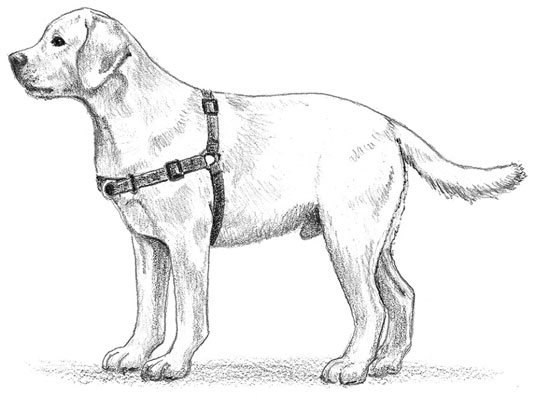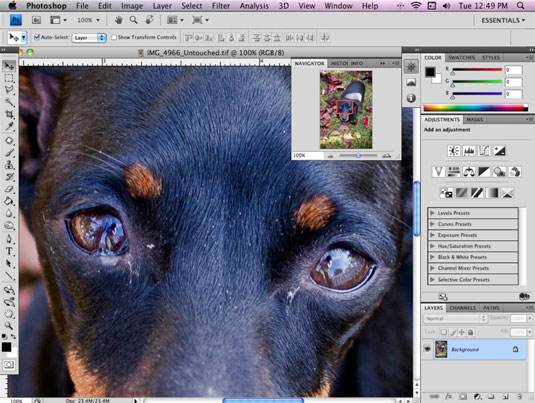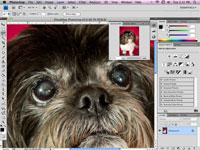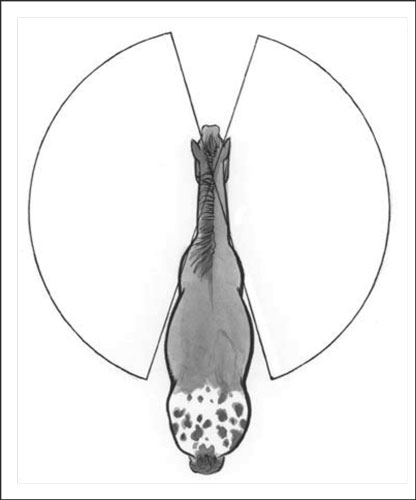Lightroom内で犬の写真のコレクションを設定する方法

犬の写真をすべて整理する時が来ました!Lightroomには、非常に優れた整理ツールがいくつかあります。その核心は、コレクションと呼ばれる小さな機能です。写真をLightroomにインポートすると、ソフトウェアが自動的に写真を[フォルダー]パネルに追加します。このパネルを介して、特定の[…]に移動するのと同じように移動できます。
馬は膝の上に座ることはできません。一方、子猫のギャロップには行けません。他の動物と同様に、馬は毎日の世話と定期的な手入れが必要です。馬を購入する場合は、尋ねるべき正しい質問を知る必要があります。また、馬を所有している場合は、馬が健康上の緊急事態を経験していることを認識できる必要があります。馬は大きな責任ですが、それだけの価値があります。
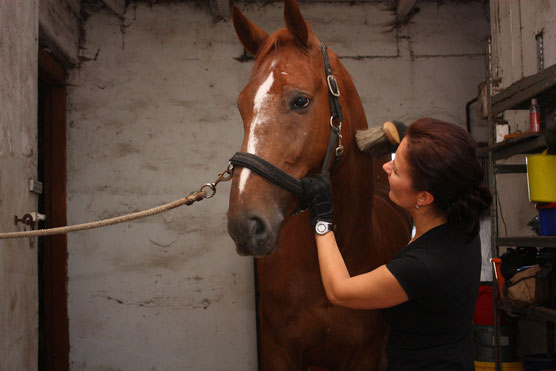
©AnastasijaPopova / Shutterstock.com
馬を買うのは大したことです。それは、いくらかの考えと準備に値し、必要なプロセスです。あなたがあなたの馬の買い物の冒険に出発するとき、売り手のために以下の質問であなた自身を武装させてください:
あなたはいくら馬を求めていますか?この価格は交渉可能ですか?
この馬は何歳ですか?
馬の大きさはどれくらいですか?(手はいくつですか?)
馬の性別とサイズは何ですか?
馬はどの分野に乗っていますか?
馬は専門的な訓練を受けたことがありますか?
馬は初心者のライダーに適していますか?
馬は子供に適していますか(馬に乗る子供がいる場合)?
馬はトレーラーに積み込まれますか?
馬は、齰癖(空気を吸いながら柵を噛む)、織り(前足から前足に繰り返し前後に移動する)、縛られたときに引き戻すなどの悪い習慣がありますか?
馬に疝痛、跛行、アレルギーなどの医学的問題や病歴がありますか?
なぜ馬を売っているのですか?
馬の世話は大きな責任であり、あなたは毎日馬の友人の世話をしなければなりません。次のリストは、あなたがあなたの馬のために毎日達成する必要があるタスクを説明しています:
あなたの馬を清潔に保ち、見栄えを良くすることは、馬の所有権の重要な部分であり、さらに、それは楽しいことがあります!以下は、手元にある必要のあるグルーミングツールのリストです。
ラバーカレーコーム
固いブラシ
ソフトブラシ
脱落刃
布
たてがみと尾のブラシ
たてがみと尾のもつれ解消
蹄ピック
蹄ブラシ
入浴用品(シャンプー、コンディショナー、スポンジなど)
バリカン
あなたの馬は、あなたや他のすべての動物と同様に、健康上の問題を起こしやすいです。次の表の症状の列にある問題は、すぐに注意を払い、獣医に連絡する価値のある問題です。
| 症状) | 考えられる原因 | 実行する手順 |
|---|---|---|
| 出血 | 怪我 | 圧力をかけます。獣医に電話する |
| 血尿 | 重度の感染症または膀胱損傷 | すぐに獣医に電話してください |
| 食べ物が 口から出るときに頭を下げて咳と唾液分泌 |
窒息 | 馬は呼吸できますが、すぐに獣医に電話してください |
| 立つことができない; 驚異的 | 重度の病気 | すぐに獣医に電話してください |
| 液体の悪臭のする排泄物 | 下痢 | すぐに獣医に電話してください |
| 大量の発汗、横になって起き上がる、地面を撫でる、 腹部を噛む |
疝痛 | 食べ物を取り除きます。すぐに獣医に電話してください |
| 急速な呼吸、荒い呼吸、激しい咳 | 病気や感染症 | すぐに獣医に電話してください |
| 食べることを拒否する | 重篤な病気または軽度の疝痛 | すぐに獣医に電話してください |
| 激痛 | 怪我や病気 | すぐに獣医に電話してください |
| 排便または排尿するための緊張 | 腸または尿道の閉塞 | すぐに獣医に電話してください |
| 触ると熱くなる腫れや体の部分 | 怪我 | すぐに獣医に電話してください |
| 涙目; 目を閉じて; 赤眼; 曇った目 | 目の怪我または感染症 | すぐに獣医に電話してください |
98〜101.5ºFを大幅に上回るまたは下回る温度 |
熱 | すぐに獣医に電話してください |
To see things from the horse’s perspective, you need to know — literally — how the horse takes in the world. Humans evolved to be hunters and gatherers, chasing down prey and finding appropriate plants to eat. Horses, on the other hand, are built to avoid hunters and eat nearly everything that grows around them. Given these fundamental distinctions, the horse’s senses are bound to have nuances that are somewhat different from those of a human.
Sight
Sight is the most important equine sense. For a prey animal like the horse, in the wild, good eyesight means the difference between life and death. Literally seeing trouble coming is the best way the horse has to make it to safety before a predator gets too close.
Because horses have long, narrow heads with eyes on either side, they have the ability to take in more of the view than humans do. When their heads are facing forward, horses have a nearly 180-degree field of vision. They can see in front of and almost all the way around their bodies, though they do have some blind spots.
One of a horse’s blind spots is directly behind, so you should never approach a horse from the back unless the horse already knows you’re there.
No one knows for sure how far horses can see, mainly because horses have trouble pronouncing the letters on eye tests. Scientists who have done experiments in this field have made some educated guesses that horses can see pretty darn far, in the realm of at least hundreds of yards away. Horses can distinguish patterns, which means they’re able to take in fine details. They can also perceive depth well.
Horses also have much better night vision than humans. Many a rider has been out on a dark, moonless trail, dumbfounded by his or her horses’ ability to see where the pair are going despite the incredibly dim light.
Scientists know far less about horses’ color vision than they do about other areas of equine sight, but they’re certain that horses see many of the same colors that we see, with two exceptions: red and green. In fact, they believe that horses have the same color vision as humans who suffer from red-green color blindness. That said, horses are still able to pick out the greenest grass in a field!
Hearing
A species that survives by getting a head start on marauding predators needs a pretty good sense of hearing. The fact that horses have survived all the way to modern times is testimony to their incredible hearing, which is considerably better than a human’s.
If you look at the shape of the horse’s ear, you can see that it’s built sort of like a funnel. With this design, the ear can capture sound in its outer part and channel it down into the ear canal. The broad outer part of the horse’s ear very adequately takes in the slightest sound in the horse’s environment.
Using very mobile ears, horses constantly monitor the world around them. Just imagine trying to pay complete attention to different sounds coming in to either ear at the same time. Impossible for a human, yet the horse does this on a steady basis. A horse can take in the sounds of a car driving by, children playing, a bird chirping and a human approaching, all at once, from different places in the environment. The horse then processes that information and makes split second decisions about whether to react — all while picking out the best blades of pasture grass or meandering down a rocky trail. The process really is mind-blowing.
Loud, unfamiliar noises can send a relaxed horse into a tizzy. On the other hand, a placid, reassuring sound can ease a horse’s worries. It’s amazing to see how a frightened horse can be comforted by a soft, gentle voice from a calm and confident human. Keep this fact in mind when handling your horse in a particularly noisy or frightening environment.
Smell
Like most non-human animals, horses have an acute sense of smell that they regularly employ to provide them with information on what is going on around them. Horses use their sense of smell in a number of different and important ways.
Nature equipped the equine with a strong olfactory sense that can tell the animal whether a predator is near. All it takes is a strong upwind breeze to bring a dangerous scent to the attention of a wild herd. After getting a whiff of the predator, the herd literally high-tails it (their tails stick way up in the air as they flee) out of there in a flash.
Horses also use smell as part of their complicated social structure. Horses typically greet each other nose to nose, each taking in the odor of the other. Horses also come to recognize each other by scent as well as by sight. Mares and foals quickly memorize each other’s scents and use this information to help locate each other in a crowd of horses.
Most horses also greet humans in the same way. When you introduce yourself to a horse for the first time, notice how the horse reaches out his muzzle to sniff you. Given this, the most polite way to approach a horse is with the back of your hand extended so the horse may take in your personal scent. Letting a horse breathe in your scent tells the animal that you are a fellow herdmate (not a predator), and usually makes the horse more agreeable to being handled.
Touch
The equine sense of touch is an important (although often overlooked) element to the horse. Although many people think that horses have a tough hide, they really don’t. Their skin is tougher than our human epidermis, but it is still rich with nerve endings.
If you sit on a pasture fence and watch a herd of horses for a few hours, you’ll see plenty of evidence of how horses use touch to communicate with each other. Mothers reassure their babies with a brush of the muzzle; comrades scratch each other’s itches with their teeth. Whenever a message needs to be sent from one horse to another, visual cues and touch — or the threat of it — are nearly always used.
Humans can also use touch to convey messages to the horse. A gentle rub down, a pat on the shoulder, a vigorous massage in just the right place — these are all ways of saying, “I’m your friend” to a horse. Sometimes, if you’re lucky, you’ll get a similar tactile message in return.
Check out the following resources as your appetite for equine (horse) knowledge increases.
Breed registries
Appaloosa Horse Club
2720 W. Pullman Rd.
Moscow, ID 83843-0903
(208) 882-5578
www.appaloosa.com
International Colored Appaloosa Association
4610 New Mexico 206
Milnesand, NM 88125
(547) 238-4280
www.icaainc.com
Arabian Horse Association
10805 E. Bethany Dr.
Aurora, CO 80014
(303) 696-4500
www.arabianhorses.org
American Miniature Horse Association
5601 South IH 35W
Alvarado, TX 76009
(817) 783-5600
www.amha.com
American Morgan Horse Association
4066 Shelburne Rd., Suite 5
Shelburne, VT 05482-0960
(802) 985-4944
www.morganhorse.com
American Paint Horse Association
P.O. Box 961023
Fort Worth, TX 76161-0023
(817) 834-2742
www.apha.com
American Quarter Horse Association
1600 Quarter Horse Dr.
Amarillo, TX 79104
(806) 376-4811
www.aqha.com
Racking Horse Breeders Association of America
67 Horse Center Rd., Suite B
Decatur, AL 35603-9735
(256) 353-7225
www.rackinghorse.com
American Saddlebred Horse Association
4083 Iron Works Pkwy.
Lexington, KY 40511-8434
(859) 259-2742
www.saddlebred.com
United States Trotting Association (Standardbreds)
6130 S. Sunbury Rd.
Westerville, OH 43081-9309
(877) 800-8782
www.ustrotting.com
Tennessee Walking Horse Breeders’ & Exhibitors’ Association
P. O. Box 286
Lewisburg, TN 37091-0286
(931) 359-1574
www.twhbea.com
The Jockey Club (Thoroughbreds)
821 Corporate Dr.
Lexington, KY 40503-2794
(859) 224-2700
www.jockeyclub.com
Educational organizations
American Horse CouncilDocument1
1616 H Street NW, 7th Floor
Washington, DC 20006
(202) 296-4031
www.horsecouncil.org
CHA (Certified Horsemanship Association)
1795 Alysheba Way, Suite 7102
Lexington, KY 40509
(859) 259-3399
www.cha-ahse.org
United States Pony Clubs, Inc.
4041 Iron Works Pkwy.
Lexington, KY 40511-8462
(859) 254-7669
www.ponyclub.org
Equine rescue groups
American Standardbred Adoption Program
745 S Main St.
Viroqua, WI 54665
(608) 689-2399
www.4thehorses.com
Standardbred Retirement Foundation
42 Arneytown-Hornerstown Rd.
Cream Ridge, NJ 08514
(609) 738-3255
www.adoptahorse.org
The Horse Protection League
P. O. Box 741089
Arvada, CO 80006
(303) 216-0141
thehorseprotectionleague.org
Equine equipment
Dover Saddlery, Inc.
525 Great Rd.
Littleton, MA 01460
(800) 406-8204
www.doversaddlery.com
Jeffers Equine
P.O. Box 100
Dothan, AL 36302
(800) 533-3377
www.jeffersequine.com
Logan Coach Trailers
2990 S. 800 W.
Nibley, UT 84321
(800) 742-7047
MD Barns
720 E. Locust Street
Ontario, CA 91761
(800) 343-2276
www.mdbarnmaster.com
Morton Buildings, Inc.
P.O. Box 399
Morton, IL 61550-0399
(800) 447-7436
www.mortonbuildings.com
State Line Tack
395 Oak Hill Rd., Suite 210
Mountain Top, PA 18707
(888) 839-9640
www.statelinetack.com
Sundowner Trailers, Inc.
9805 OK Hwy, 48 South
Coleman, OK 73432-8523
(800) 438-4294
www.sundownertrailer.com
Equine slaughter information
American Association of Equine Practitioners
4033 Iron Works Pkwy.
Lexington, KY 40511
(859) 233-0147
www.aaep.org
Equine Advocates, Inc.
P.O. Box 354
Chatham, NY 12037-0354
(518) 245-1599
www.equineadvocates.org
Equine Protection Network, Inc.
P.O. Box 232
Friedensburg, PA 17933
www.saveamericashorses.net
Humane Society of the United States
1255 23rd Street NW, Suite 450
Washington, DC 20037
(866) 720-2676
www.humanesociety.org
Equine retirement facilities
Apple River Ranch Equine Retirement
415 Jackson St., Box 358
Hanover, IL 61041
(815) 591-3819
appleriver1.tripod.com
The P.E.I. Equine Retirement Society
Milburn, O’Leary RR#2
Prince Edward Island, C0B-1V0
Canada
(902) 859-3116
www.angelfire.com/ca/equineretirementsoc/
Heavenly Horse Haven
P.O. Box 391998
Anza, CA 92539-1998
(951) 551-3561
www.heavenlyhorsehaven.org
Pet loss hotlines
ASPCA Grief Counseling Hotline
(877) 474-3310
Tufts University School of Veterinary Medicine (Massachusetts)
(508) 839-7966
Virginia-Maryland Regional College of Veterinary Medicine
(540) 231-8038
Michigan State University College of Veterinary Medicine
(517) 432-2696
Washington State University College of Veterinary Medicine
(866) 266-8635
Activity organizations
American Endurance Ride Conference (AERC)
P.O. Box 6027
Auburn, CA 95604
(866) 271-2372
www.aerc.org
Cowboy Mounted Shooting Association
P.O. Box 157
Roswell, NM 88202
(888) 960-0003
www.cowboymountedshooting.com
National Reined Cow Horse Association
1017 N. Hwy. 377
Pilot Point, TX 76258
(940) 488-1500
www.nrcha.com
North American Trail Ride Conference (NATRC)
P.O. Box 969
Beatrice, NE 68310
(303) 688-1677
www.natrc.org
Ride & Tie Association
P.O. Box 2750
Rancho Santa Fe, CA 92067
www.rideandtie.org
United States Dressage Federation
4051 Iron Works Parkway
Lexington, KY 40511
(859) 971-2277
http://usdf.org
United States Equestrian Federation
4047 Iron Works Parkway
Lexington, KY 40511
(859) 258-2472
Western Dressage Association of America
P.O. Box 2349
Parker, CO 80134
(720) 662-4584
www.westerndressageassociation.org
Other equine organizations
American Farriers Association
4059 Iron Works Pkwy., Suite 1
Lexington, KY 40511-8434
(859) 233-7411
www.americanfarriers.org
アメリカ乗馬インストラクター協会
28801TrentonCt。
ボニータスプリングス、フロリダ州34134-3337
(239)948-3232
www.riding-instructor.com
Equine Connection National AAEP Locator Service(馬の獣医)
https://aaep.org/horse-owners/get-dvm
障害者の
私書箱のための北米の乗馬33150Denver
、CO 80233
(800)369-RIDE(800-369-7433)
www.narha.org
馬情報サイト
HorseIllustrated.com
www.horseillustrated.com
InfoHorse.com
www.infohorse.com
国際馬の博物館
www.imh.org
TheHorse.com
www.thehorse.com
馬の出版物
Equus
(800)829-5910
www.equusmagazine.com
ホース&ライダー
(877)717-8928
www.horseandrider.com
馬のイラスト
(844)330-6373
www.horseillustrated.com
実用的な騎手
(877)717-8929
www.practicalhorsemanmag.com
ウエスタンホースマン
(817)737-6397
www.westernhorseman.com
ヤングライダー
(844)330-6373
www.youngrider.com
推奨読書
以下の本は、あなたが馬の世話と馬術のさまざまな側面についてもっと学ぶのを助けるか、あなたが体を整えることによってあなたがより良いライダーになるのを助けることができます。
犬の写真をすべて整理する時が来ました!Lightroomには、非常に優れた整理ツールがいくつかあります。その核心は、コレクションと呼ばれる小さな機能です。写真をLightroomにインポートすると、ソフトウェアが自動的に写真を[フォルダー]パネルに追加します。このパネルを介して、特定の[…]に移動するのと同じように移動できます。
子犬が成熟してレッスンが始まると、ナイロンの首輪またはハーネスから、突進、引っ張り、および全体的な反応性を妨げるコンディショニングまたはトレーニングの首輪に切り替えて、より丈夫なひもに切り替えることができます。あなたの子犬の焦点を奨励するために積極的な補強を使用してください。コンディショニングカラーは、子犬があなたの近くを歩くように促します[…]
ジャックラッセルテリアの外での活動にもよりますが、入浴する必要があるのは毎月かそれ以下です。もちろん、テリアが日常的に土の中を転がっている場合は、もう少し頻繁に入浴する必要があるかもしれません。短くて頻繁な入浴は、長くて頻度の低い入浴よりも優れています。取得する […]
あなたの新しい犬が正真正銘のジャーマンシェパード犬であることを確認するために、彼は「書類」を必要とします—あなたのジャーマンシェパードの純粋な祖先の証拠です。書類は、レジストリによって発行された同腹児または個人登録証明書で構成されています。ほとんどの場合、レジストリはAmerican Kennel Club(AKC)ですが、ドイツの輸入品が登録されています[…]
評判の良いブリーダーは、質問に喜んで答えるだけでなく、猫や子猫を共有したい思いやりのあるバイヤーのサインとして彼らを歓迎します。いくつか質問することで、ブリーダーについて多くのことを知ることができます。これらを試して、正しい答えを注意深く聞いてください。
獣医はあなたの子猫の友達ですが、あなたがいつも見たくない動物愛護のプロです。あなたの子猫が病気や怪我のために獣医を訪問しなければならない場合、あなたの選択肢を探求し、将来の訪問に対する予防策を検討するためにあなたの獣医にこれらの質問をしてください:これはどれくらいの費用がかかりますか?何ですか[…]
猫が怪我をしたり病気になったりした場合は、獣医や救急医療施設に急いで行く必要があるかもしれません。以下は、猫が獣医に診てもらう必要があるいくつかの症状のリストです:発作、失神、または虚脱。どんなに軽度であっても、目の怪我。嘔吐または下痢– […]
最も手入れの行き届いた犬でさえ、時々臭い不快感を覚えることになります。彼らは、朝の目の皮を拭いたり、自分の毛皮を磨いたり、あごからぶら下がっているよだれをスワイプしたりするための手を正確に持っていません。明らかに、写真を撮る前に欠陥を取り除くことは良い考えですが、[…]
視力に問題のある年配の犬に出会ったことがあるなら、犬の目にぶら下がる白っぽい雲をご存知でしょう。老犬の白内障によって引き起こされることもありますが、この状態は写真でさらに明らかになります。この問題を解決し、リリーベルの目に元気を取り戻すには、書き込みツールを使用します[…]
馬が住んでいる世界について学び、馬を理解し、適切に世話をするために、感覚を通して周囲の世界をどのように認識しているかを学びます。
